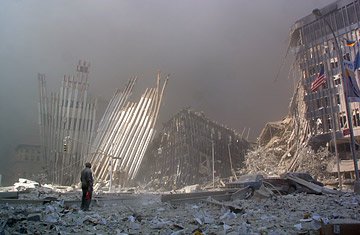
A man stands in the rubble, and calls out asking if anyone needs help, after the collapse of the first World Trade Center Tower in New York City on September 11, 2001.
(3 of 10)
For the myriad small villages that make up the city, the local firehouse is not just a protector but a nerve center, a town square and a hearth. JoAnn McCluskey, whose husband was with Engine 54 before his death five years ago, says, "This place was like a family. We did Christmas parties and picnics. One guy used to get on top of the building across the street and get in the cherry picker on the fire truck and be Santa." Even, or especially, for neighbors who didn't have a personal connection to the fire fighters or the victims, the station provides an emotional focus. Tamar Kaman, a cosmetics marketer who lives three blocks away, cried as she added flowers to the pile. "This is as close as I've gotten to some of the victims," she said. "Whether or not I can identify all the faces, I feel connected to the grief somehow." This is what a firehouse does in a time of disaster. First it puts out flames. And then it generates warmth. --By James Poniewozik. Reported by Harriet Barovick
In a Dark Time, Light
In Manhattan, where "good" is just the name of a restaurant in Greenwich Village and "evil" is what we call the prices at the new Chanel store in SoHo, the concept of miracles seemed a little hokey until last week. A pointy-head at one of the city's universities might have said the idea of the miraculous is an old metaphor that needs demystifying.
But there's nothing metaphorical about what happened to Genelle Guzman, 31, an office manager who worked on the 64th floor of Tower 1. She called her boyfriend, Roger McMillan, just after the blast and told him she was waiting at her desk, as instructed over the loudspeaker. McMillan, 38, a pressman for a direct-mail company, could see the explosions from his workplace, and told her to get out and meet him in front of Century 21, a discount fashion emporium across from the Trade Center.
He ran and walked 20 blocks, past bloody survivors and jet parts, until he saw the street in front of the store. It was a mountain of detritus. He searched in vain, then called his voice mail. Guzman had left a message saying once again she was staying put, as instructed. "I lost all hope when I heard that," he says.
What he didn't know was that Guzman had started down the stairs when word came to evacuate. At floor 13, the building collapsed, and Guzman's head was caught between two pillars. She lay in fear and agony for hours. She felt a man trapped near her and pushed next to him for comfort. She heard him cry out twice; eventually, he fell silent. She repeatedly asked God, "Please give me a second chance at life." There was only darkness and dust. So she said another prayer: "Please just give me this one miracle." And a man appeared above her, a saint named Paul, who lifted her from the rubble. Twenty-six hours had passed.
Now at Bellevue Hospital, Guzman is one of just five victims rescued from the Trade Center after Tuesday. Her head is swollen, and her legs required surgery, but doctors expect full recovery. Guzman and McMillan, Trinidadian immigrants who live in Brooklyn, plan many changes. "Before, we went to church on a couple of occasions," says McMillan. "It's something you put off. But Genelle already stated in the hospital bed that this is her calling to God." The two plan to marry.
